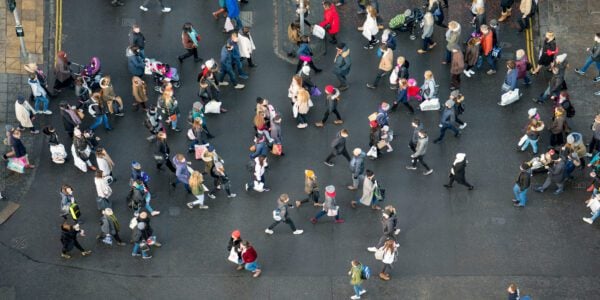
14/09/21
4 min read
Doctors of the World (DOTW) and the University of Birmingham (UoB) have today published Migration and Vulnerability during the Pandemic: Barriers to Wellbeing, which has revealed that refugees, asylum seekers and migrants reported higher levels of bad health and inadequate housing during the COVID-19 pandemic, as well as difficulties registering with a GP and accessing remote healthcare services, suggesting significant unmet healthcare needs.
Conducted by leading academics from UoB, using data from DOTW, and funded by the Nuffield Foundation and the Economic and Research Council, the report has examined health, housing and economic situations. It has also looked at the reasons why individuals needed to access DOTW’s services and how often services were accessed.
Participants, whose data has been anonymously reported on, come from four categories of migrants with insecure immigration status: refugees; asylum seekers; refused asylum seekers, and undocumented migrants.
Concerningly, the number of requests for consultations dropped from 178 in January 2020 to 58 in September 2020, at one of the many peaks of the pandemic, while at the same time there was a significant increase in the number of service users reporting ‘bad’ or ‘very bad’ health.
The majority of the consultation requests were around: help with GP registration; help with NHS costs; queries about antenatal care; queries about immigration; queries about A&E and walk-in clinics, and queries and advice about secondary care (including charging). This finding provides further evidence that people with insecure immigration status are often not registered with a GP and are largely excluded from NHS services, and has implications for the COVID-19 vaccination programme which requires individuals to have an NHS number and an active GP registration in order to book a vaccination appointment.
In addition to this, the number of people accessing DOTW services who reported to be in insecure/inadequate housing situations rose from 44% to 62.8% during the pandemic. However, the number of people reporting as roofless/homeless dropped slightly from 6.3% to 6.1%.
The data was collected as the government launched the ‘Everyone in’ policy (27 March 2020) to provide hotel and emergency accommodation to all people sleeping on the streets regardless of immigration status, which allocated £3.2million of funds to local authorities in England to bring all those living on the streets into self-contained accommodation as a response to the COVID-19 crisis and suspended all evictions from Home Office asylum accommodation. During this period the numbers of asylum seekers living in hotel accommodation increased dramatically, with the research indicating that they were struggling to access much needed healthcare whilst living in hotels.
Policy recommendations
The report makes a number of policy recommendations aimed improved public health measures and at supporting those in vulnerable circumstances in accessing healthcare. These include:
- Remote provision clearly does not enable contact from all migrants requiring support to access healthcare. As the UK returns to a greater degree of normality, reinstating some face-to-face provision is important to ensure all needs are addressed;
- The increase in asylum seeker users and deterioration in general health in this group points towards potential problems with a) access to healthcare for those housed in hotels b) the health of those living in hotels. The Asylum Providers Accommodation contract should be amended so the statement of requirements includes people in initial/contingency accommodation receiving support to register with a GP following the HA Select Committee recommendation;
- Provision of Wi-Fi or data should be a priority for people living in poverty so that they are not excluded from services as they move online;
- GP surgeries should be encouraged to continue to register new patients throughout the pandemic;
- Increasing migrants’ and practitioners’ understanding or knowledge of the healthcare system, especially awareness of the charging exception. This is vital for both healthcare professionals and individuals at risk of vulnerability. Clear guidance should be provided on the government website in different languages;
- Given that not everyone has been vaccinated, it is necessary to distribute free face masks to individuals at risk of vulnerability, because they often rely heavily on public transport and lack resource to purchase PPE.
You can find the full list of recommendations in the report.
Anna Miller, Head of Policy and Advocacy at Doctors of the World, said: “This report makes for stark reading. Unable to access NHS services, forced to manage health conditions alone and struggling with poor housing, the report shows just how difficult the pandemic has been for people with insecure immigration status. And the importance of this cannot be understated – our pandemic response relies on whole population having good access to medical care and being able to protect themselves from the virus.”
Jenny Phillimore, Professor of Migration and Superdiversity at the University of Birmingham, said: “Our analysis clearly indicates that the shift from face to face to virtual or phone services risks excluding the most vulnerable migrants. We are also concerned about the increase in numbers of asylum seekers accessing the service – this demonstrates, as several organisations have suggested, that the accommodating asylum seekers in hotels makes access to much needed healthcare services difficult.”
Alex Beer, Welfare Programme Head at the Nuffield Foundation, said: “The effects of the COVID-19 pandemic have exacerbated existing inequalities and vulnerable groups have faced particular adversities. This important research shines a light on the unmet health needs and precarious living situations faced by refugees, asylum seekers and vulnerable migrants, and highlights the need for policymakers and service providers to ensure that vulnerable groups have the means and support to access the health services they are entitled to.”




















































